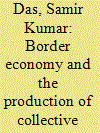| Srl | Item |
| 1 |
ID:
134953


|
|
|
|
|
| Summary/Abstract |
While globalisation unleashes forces that the Indian State1 finds increasingly difficult to stop and contain, a variety of intermediate institutions has emerged in recent years ranging between a fully securitised State and a State integrated fully into the world economy. These obviously call new configurations of border and border economy into existence as much as contribute to the production of new and hitherto unknown political subjects. Border economy produces the community and not the other way round. Border trade is one of the many instrumentalities through which the flow of persons, goods and services is sought to be contained in order to help making the nation in the border. Ethnicity and ethnic identification serve as a technology for governing the unofficial trade and contributes to the production of ethnic subject. Besides, it is important to understand how a number of people eke out a living by taking advantage of differential pricing across the border. Thus, the labouring life of the subaltern has become an agent, and a moral community thus gets produced, bringing about, in the process, mutation in the dominant discourses of national security and functional integration.
|
|
|
|
|
|
|
|
|
|
|
|
|
|
|
|
| 2 |
ID:
135795


|
|
|
|
|
| Summary/Abstract |
This paper reports on an ethnographic study of a village near the town of Sangola in the Sholapur district of Maharashtra, India. The paper is influenced by the feminist interpretations of Gayatri Chakrabarty Spivak, and her plausible enquiry into gender imperialism, colonialism and Western dominations in one hand, and the critique of the quite celebrated development research approach of the 1980s - the participatory rural appraisal (PRA), on the other. Further proposing a new way of looking into ‘participation’ in development practices. Furthermore, it draws out the politics of ‘voice’, empowerment and participation as integral to women’s rights – and also to study men and their changing masculinities with regard to gender inequalities in the village.
|
|
|
|
|
|
|
|
|
|
|
|
|
|
|
|